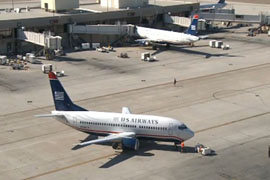Arizona Joins Lawsuit to Block American-US Airways Merger

Cronkite News
WASHINGTON – Arizona joined a Justice Department lawsuit Tuesday to block the proposed merger of Tempe-based US Airways and American Airlines, saying the merger would eliminate competition and hurt consumers with higher airfares and fewer choices.
In a joint response, the air carriers vowed to “mount a vigorous and strong defense” against the suit by Justice, six states and the District of Columbia, which the airlines called “wrong in its assessment of our merger.”
The proposed $11 billion merger would have created the largest airline in the U.S. and was scheduled to close in the third quarter of this year after months of work between US Airways and Fort Worth-based American, which is currently in bankruptcy proceedings. But Tuesday’s action is likely to delay any merger, airline officials said.
Critics have repeatedly raised concerns about antitrust problems with the merger between the two carriers, following several years of mergers by other airlines.
“We think it’s pretty messed up,” said Bill Baer, assistant attorney general for the antitrust division in a conference call to announce the lawsuit. “It’s pretty bad for consumers.
“While shareholders might benefit, creditors might benefit from consolidation, the fact of the matter is, consumers will get the shaft. The right option here is a full-stop injunction,” Baer said.
The lawsuit, filed Tuesday in U.S. District Court for the District of Columbia, said that besides increased airfares, consumers would likely have to pay more checked bags, ticket changes and other fees. All told, the complaint said, the merger could cost consumers an additional $280 million each year.
Arizona Attorney General Tom Horne said he joined the suit because the planned deal is “anticompetitive” and would be bad for consumers, and workers, in the state.
“Arizona consumers will be forced to pay millions of dollars more each year in increased airfare if it goes through as planned,” Horne said in a statement from his office Tuesday.
“Competition is crucial for a vital economy,” his statement said. “As the state’s chief legal officer, it is my duty to maintain competitive markets in Arizona for the benefit of our citizens.”
A spokeswoman for Horne’s office said Arizona also needs to be concerned about the possible loss of jobs in a merger. The airlines have said they will retain offices in Arizona but that the headquarters of the new airline – to be named American Airlines – would be in Fort Worth.
“It’s a major hub here. If they move their operation to Texas, which is where they will go after the merger, that would mean possible job loss,” said Stephanie Grisham, Horne’s spokeswoman.
In February testimony to a congressional committee, US Airways Executive Vice President Stephen L. Johnson acknowledged that some jobs would move from the current headquarters in Tempe, but said the company would still employ about 9,000 people in Arizona after a merger.
The two carriers argued Tuesday that blocking the merger would “deny customers access to a broader airline network that gives them more choices,” not fewer as critics have charged. They said a merged airline would promote competitiveness by maintaining the current hubs of each airline while allowing for expanded service from those hubs, allow for better pay and benefits for employees, and increase services for travelers.
“We will mount a vigorous defense and pursue all legal options in order to achieve this merger and deliver the benefits of the new American to our customers and communities as soon as possible,” the joint statement said.
US Airways CEO Doug Parker said in an internal letter Tuesday that the companies no longer expect the merger to close during the third quarter of 2013.
“We are extremely disappointed in this action,” he wrote after the Justice announcement. “We will fight them.”
“We are hopeful that the litigation will be successfully concluded and we will close the merger before year end,” Parker wrote.
But opponents of the merger welcomed Justice’s action.
Charlie Leocha, director of the Consumer Travel Alliance, called the lawsuit to block the merger “the best thing that could have possibly happened for consumers.” He said he was not surprised by the suit, only that Justice announced it now instead of later.
Besides the District and Arizona, states joining the Justice complaint included Texas, Florida, Pennsylvania, Tennessee and Virginia.















